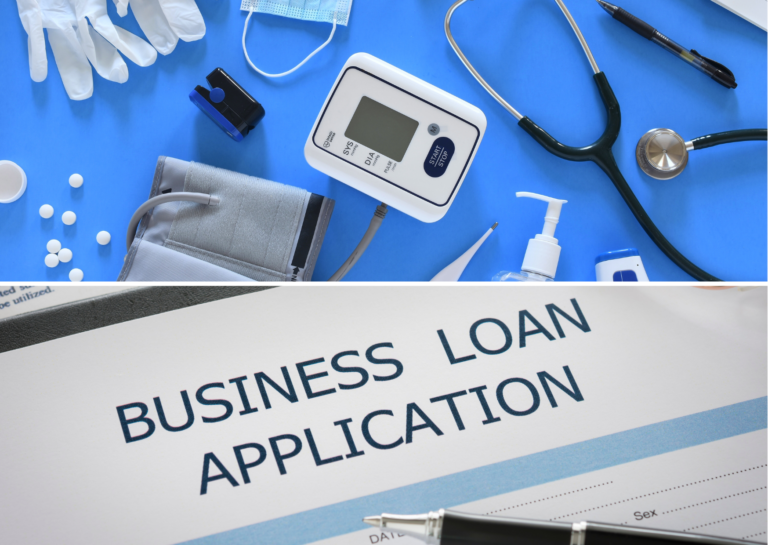Business Loan vs. Medical Equipment Loan
A company venture can be financed in a variety of ways. You can talk to your bank, sell stock in your company, ask your friends and relatives, and so on. Choosing a course of action can be challenging since there are so many possibilities available. Even if you are convinced that you want to borrow money from a lender, you still need to decide on the specific loan type.
There are two main choices available to medical professionals who wish to borrow money for medical equipment. You have the choice of a specialist Medical Equipment Loan or a Business Loan.

Table of Contents
Purpose
- Business Loan
The type of loan that will best suit your needs depends on the loan’s intended use. Before granting the cash, the lender will often want to know the purpose of the loan. They can then identify the borrower who has the most pressing or practical need using this information. This is so because many loans include restrictions on their intended purpose. Such loans are only able to be used for the purposes they were intended. An end-use restriction is what this is. End-use limitations are imposed by lenders so that the loan’s terms and conditions are appropriate for the borrower’s end-use and risk profile. Compared to a loan for medical equipment, a business loan has a considerably wider range of applications.
- Medical Equipment Loan
A medical equipment loan may only be used for the purchase, upkeep, or repair of medical equipment. Whether you choose a business loan or submit an online application for a loan for medical equipment may depend on this end-use limitation. A business loan would be a better fit for your needs if you plan to utilise the loan profits for anything more than just paying for your medical equipment needs.
Interest Rate and Additional Fees
The cost of the loan is determined by the interest rate and additional fees. The cost of a business loan and the cost of a loan for medical equipment are very different. This is because lenders are willing to charge a lower interest rate for medical equipment since it is thought that it is a safer credit risk than a standard Business Loan.
An online business loan typically has an interest rate of between 15% and 26%. The reliability of the borrower, whether the loan is secured or not, and the borrower’s credit score can all affect the interest rate. There are additional fees connected with a business loan.
These fees include a processing fee, prepayment fees (if you pay off the loan before the scheduled payback dates), and late payment penalties. The processing cost is typically 2% of the loan amount (which can be around 3 percent of the overdue amount per month).
In comparison, the interest rate on a loan for medical equipment is considerably lower, falling between 10% and 12%.
Additionally, this type of loan has a cheaper processing charge than a business loan. For these loans, many lenders don’t impose a prepayment penalty. The late payment penalty for these loans will, however, often be the same as for a business loan.
Loan Amount
From lender to lender, the loan amount might differ significantly. There are acceptable ranges for each lender. The size of the loan may also be influenced by a number of other variables, including the borrower’s creditworthiness, capacity to repay the loan, and financial situation.
The loan amount approved for a medical equipment loan is typically substantially bigger than that of a regular business loan. This is due to the high cost of medical equipment and the greater predicted loan repayment capacity of enterprises with a healthcare affiliation.
A loan for a business might be for anything between Rs 3 lakh and Rs 50 lakh. This is only a rough estimate.
Eligibility Requirements for Medical Equipment
- A BDS or MBBS degree is the very minimum requirement for applicants.
- Homeopathic, Unani, and Ayurvedic medicine specialists are also eligible to qualify for this loan.
- Although it may vary from one bank to the next, the age restriction for those asking for loans is generally between 25 and 65 years old.
- If a firm applies for this loan, the promoters of that company must meet the minimal requirement of having an MBBS or BDS.
- The candidates may also need to be council members, depending on the bank.
- Individuals applying for the loan must have perfect credit histories. Any bank should not classify them as defaulters. If other people are co-applying for the loan, their credit histories must also be perfect.
- Some banks may additionally demand that you have lived at your present home or worked at your current location for at least five years.
- They can also need that you have managed a medical center for at least three years.
Eligibility Requirements for Business Loan
- Independent contractors, proprietors, private limited companies, and partnership firms engaged in the manufacturing, trading, or service industries.
- The company should make at least Rs. 40 lakhs in revenue.
- People with a minimum of three years’ experience in the present industry and five years’ worth of commercial experience overall.
- Those whose company has generated profits over the past two years
- The applicant must be at least 18 years old at the time of loan application and must not be older than 65 years at the time of loan maturity.
- The business must have a Minimal Annual Income (ITR) of Rs. 1.5 lakhs per year.
